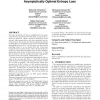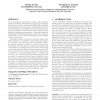164 search results - page 30 / 33 » Covert two-party computation |
SIGECOM
2003
ACM
14 years 3 months ago
2003
ACM
Preference elicitation — the process of asking queries to determine parties’ preferences — is a key part of many problems in electronic commerce. For example, a shopping age...
STOC
2010
ACM
14 years 1 months ago
2010
ACM
We study the problem of "privacy amplification": key agreement between two parties who both know a weak secret w, such as a password. (Such a setting is ubiquitous on th...
TDP
2010
13 years 4 months ago
2010
The ability to store vast quantities of data and the emergence of high speed networking have led to intense interest in distributed data mining. However, privacy concerns, as well ...
CRYPTO
2009
Springer
14 years 4 months ago
2009
Springer
The problem of carrying out cryptographic computations when the participating parties are rational in a game-theoretic sense has recently gained much attention. One problem that h...
SIGECOM
2009
ACM
14 years 4 months ago
2009
ACM
There is significant experimental evidence that prediction markets are efficient mechanisms for aggregating information and are more accurate in forecasting events than tradition...


